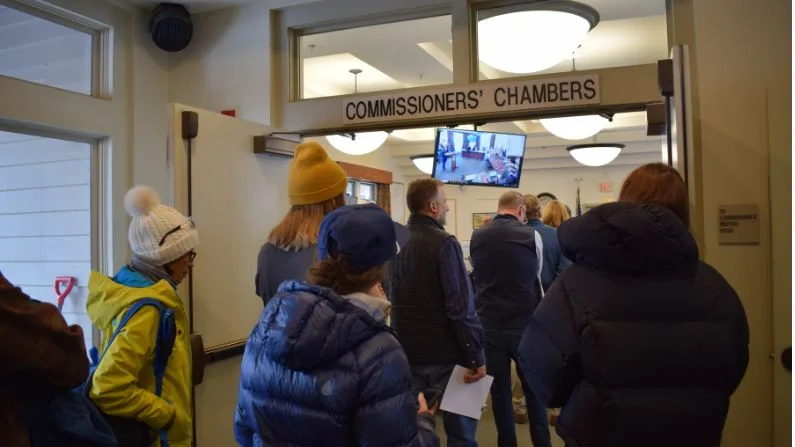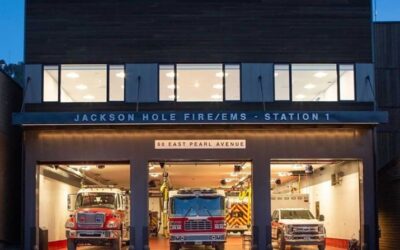Community members spilled out of the Teton County chamber doors Tuesday morning as they waited to share their thoughts on Northern South Park. The proposed development could add up to 1800 units to the 200-acre parcel south of town, many of them affordable.
Most attendees that spoke encouraged county commissioners to support the proposed land development regulations by sharing their own struggles with the housing crisis.
“I see this as my last chance to continue to stay in town and raise my son here,” said Jason Bruni, who’s lived in Jackson for 15 years.
Another longtime resident, Steve Frailin, said he was almost forced to move his family out of the valley due to the high cost of rent before buying an affordable home.
“You’ve gotta build these houses,” he said. “It’s important. It saved me. Saved my family. It saved our neighbors.”
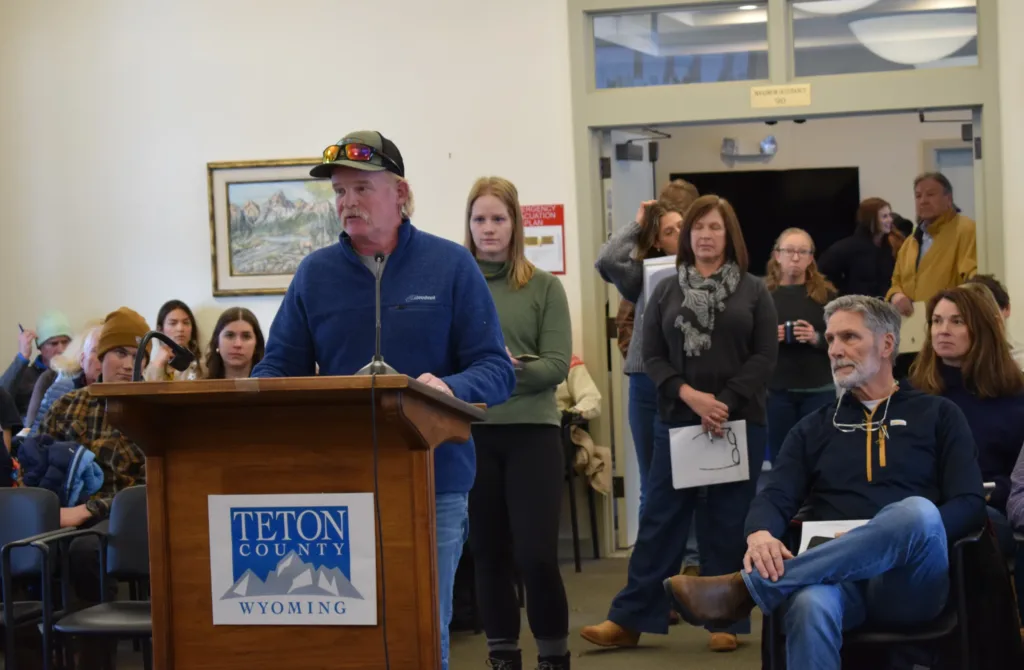
Steve Frailin tells county commissioners that his family was able to stay in town thanks to Habitat for Humanity. (Hanna Merzbach/KHOL)
Some supporters also described how businesses can’t hold onto employees, including essential workers, due to the housing crisis. Richard Uhl works at First Interstate Bank, and said this impacts their services.
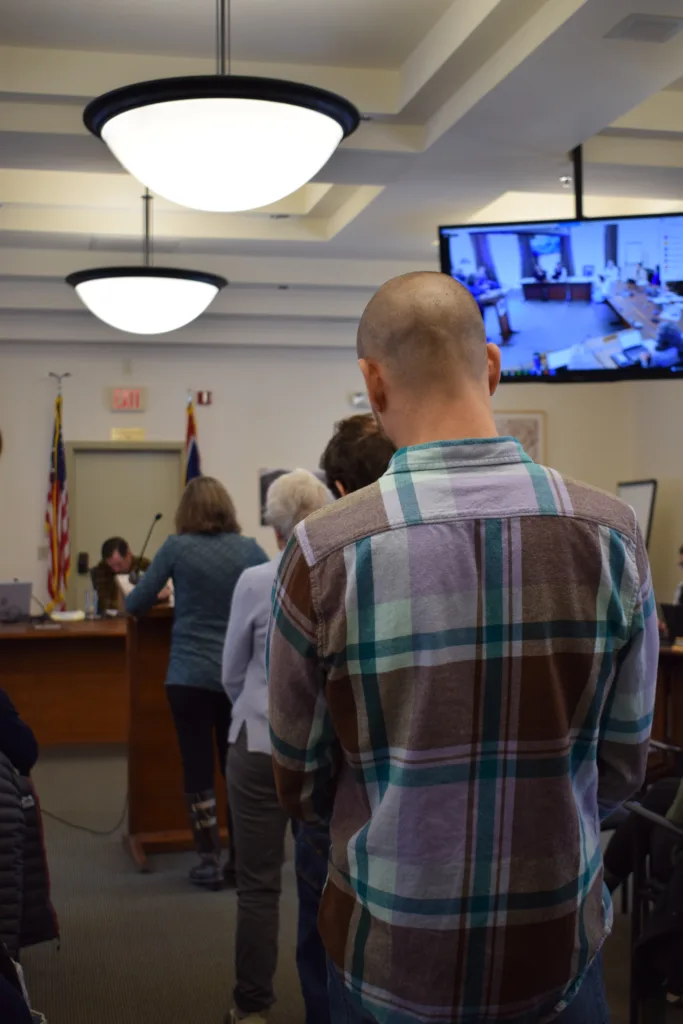
Jason Bruni, who works at Habitat for Humanity, waits in line to give public comment. He says he sees Northern South Park as his last chance to stay in town. (Hanna Merzbach/KHOL)
“We struggle to keep staff. And housing is a big part of that,” Uhl said. “We can’t pay enough for them to afford housing.”
The residents that opposed the proposed regulations asked commissioners to reconsider and clarify them. Some said the new development could overwhelm Jackson’s infrastructure, increase traffic and have a negative effect on natural resources. Mike May is in that camp.
“Do we need it? Yes. And is Northern South Park a natural place for it? Absolutely,” May said. “However, there are a lot of unanswered questions that need more clarity.”
Members of local environmental groups also said they are concerned the regulations won’t protect the region’s ecosystem. That includes Kelsey Persyn, with the Jackson Hole Conservation Alliance.
“Let’s build responsibly,” Persyn said. “The housing is important, but let’s also make sure we protect our wildlife as well.”
Margie Lynch called into the meeting, speaking for the Jackson Hole Climate Action Collective.
“We want to emphasize that the negative impacts of development, without due consideration of climate impacts, will be felt for the rest of our lives,” she said.
The Northern South Park land is owned by two multi-generational families in the region: the Gills and the Lockharts. Members of the younger generation — Nikki Gill and Chase Lockhart — attended Tuesday’s meeting, sitting in the front row on opposite sides of the room.

(Left to right) Kevin Regan, Amberley Baker and Nikki Gill sit in the front row during the public comment period at the Feb. 27 meeting. (Hanna Merzbach/KHOL)
“Ranching is the priority of the Lockhart family,” said Mark Johnson, who’s representing the family. “They are not developers as far as this property’s concerned. This is about ranching.”
While Johnson said the Lockharts don’t plan to develop their land any time soon, the Gills have been much more eager to break ground. They’ve said they intend to give a portion of their land to local housing nonprofits — in exchange for the ability to build more free-market homes.
The upzone means 70% of the units are supposed to be affordable — developed by local nonprofits Habitat for Humanity and the Jackson Hole Community Housing Trust.
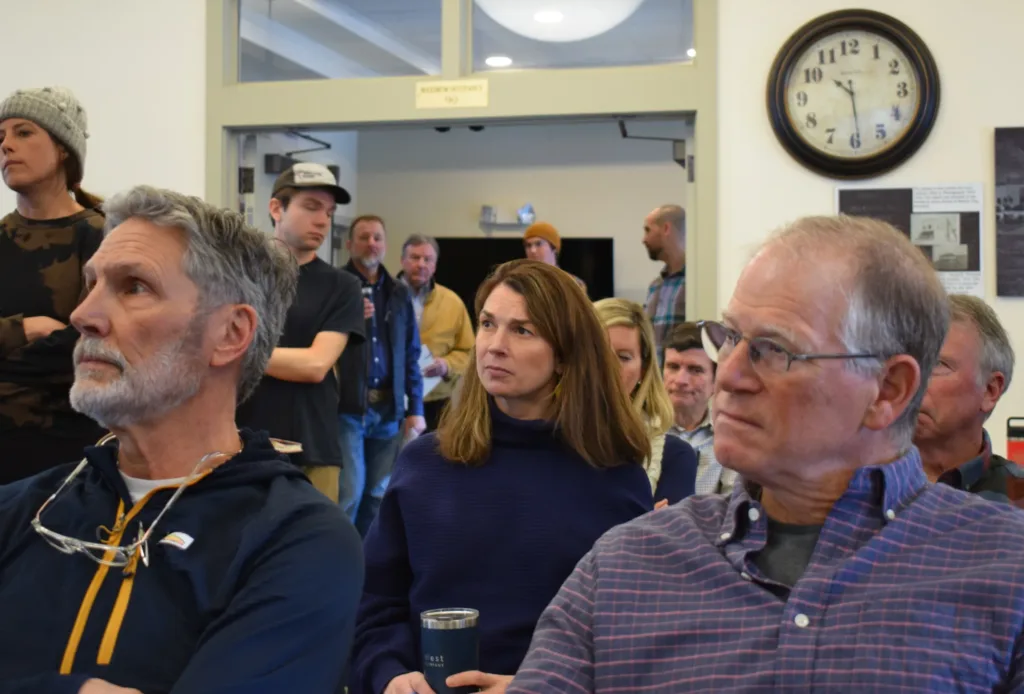
Anne Cresswell (middle), executive director of the Jackson Hole Community Housing Trust, watches the public comment meeting. She didn’t speak this time, but previously cautioned commissioners against adding stricter regulations for Northern South Park, saying the plan needs to be flexible to incentive the landowners to “opt in.” (Hanna Merzbach/KHOL)
But some have questioned if the affordable units will ever get built.
Housing advocacy group Shelter JH recently asked for more transparency into the nonprofits’ funding, and county commissioners are considering regulation to ensure affordable housing is built.
Earlier this week, the planning department proposed language that would stop the development of free-market units at 50% if no affordable ones have been built, among other restrictions.
Regardless, many said they’re confident in the nonprofits’ ability to raise the necessary funds to build — in a timely manner.
Dawn Webster said she was forced into debt after she struggled to raise her daughter as a single mother in town before securing affordable housing.
“The reason that I have been here for 20 years trying to do good for our community, working as hard as I can, is because Habitat [for Humanity] made the choice to place their bets on me and my daughter,” Webster said.
Commissioners will meet to discuss the development again on March 5. The full meeting is available to stream online on Teton County’s website.

